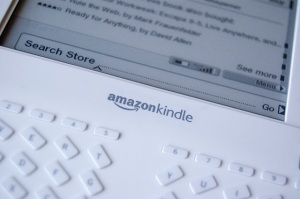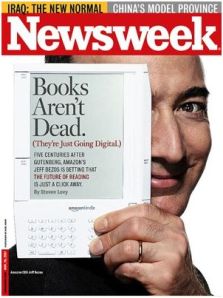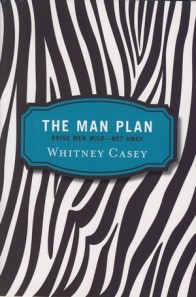 Last time, I talked about the supposed demise of books due to the technological revolution and the uphill battle that publishers and pushers of paper of all kinds are facing with the combined force of a weakened economy and a (relatively) free forum like the Internet from which to gather information. I questioned whether Amazon’s Kindle could really convince the market to switch from paper to processor and from books to e-books, even with a screen bright enough to allow you to read in a bar.
Last time, I talked about the supposed demise of books due to the technological revolution and the uphill battle that publishers and pushers of paper of all kinds are facing with the combined force of a weakened economy and a (relatively) free forum like the Internet from which to gather information. I questioned whether Amazon’s Kindle could really convince the market to switch from paper to processor and from books to e-books, even with a screen bright enough to allow you to read in a bar.
I did however, recognize the benefits that a device like Kindle could have on a struggling educational system. I’m probably not the first to think of this, but I do think it is an excellent point; this device, if provided to school and college aged kids, could revolutionize the way they read, research, write, and learn. If a university student doesn’t have to pay for or travel to obtain access to a scholarly journal or book, they are much more likely to read and implement it in their educational process. That got me imagining what else Kindle could do.
Newspapers and magazines are struggling, and there is no end in sight. Even the formidable New York Times is having trouble making it from paycheck to paycheck, and having to do a real estate shuffle to stay afloat. Sacramento Bee staffers took a pay cut so to prevent further layoffs. There is a debate going on as to whether free online content is to blame and whether newspapers can stay in business by requesting “micropayments” (e.g. 10 cents per click) or offering content on a subscription basis. Similarly, magazines (although bought and paid for) are losing advertising money and are cutting back accordingly.
So where does Kindle come in? Let’s suppose for a moment that Kindle could access the Internet on a wireless connection . Then let’s suppose that Kindle offered a database of not only books, but current “print” copies of newspapers (not web versions, but Kindle friendly versions of the actual paper), magazines, and other reading materials. So, for example, let’s say I want a subscription to the New York Times, but I am one of those people who have come of age with a cell phone in one hand and an iPod in the other. I would read the NYT but, I am not someone who will lug around a bulky paper. I will just wait until I get home, visit the New York Times website and get all of my information there.
Now let’s say that Amazon offered a subscription to the New York Times via Kindle. I could access the newspaper from my device where ever I wanted it. Let’s say the same goes for magazines. Of course, subscriptions would have to be cheap, which they could be if paper was eliminated and it was all web-based. Newspapers and magazines could offer their product to another audience, the crucial one that doesn’t necessarily have a web-based phone on which to access news and information (which even on a BlackBerry still looks like it belongs somewhere circa 1999), but isn’t inclined to purchase papers or magazines for various reasons. Let’s take it a step further and add blogs. Now readers can access books, magazines, newspaper, journals, and blogs. With Kindle (and enough storage space on the device) there is the potential to build an entire library of reference material that doesn’t get thrown away, is easily and instantaneously accessible, and is compatible with today’s web-based generation of iPod addicts and technology savvy users. Hell, a tree or two might be saved after all.
So, if these technologies are already available, why aren’t we using them? If anyone has the power to convince the world that Kindle could mean a reading and writing renaissance, it is Amazon. It’s up to them (and us, as consumers) to decide what use will be made of the technology. Not everyone will buy a Kindle (or a similar device), many will want to stick with the traditional paper versions of various media. I only pose one question; isn’t it better to read a paper on Kindle than it is for the paper to go under altogether?
At Amazon, we’ve always been obsessed with having every book ever printed, and we know that even the best reading device would be useless without a massive selection of books. Today, the Kindle Store has more than 240,000 books available, plus top newspapers, magazines, and blogs. This is just the beginning. Our vision is to have every book ever printed, in any language, all available in under 60 seconds on Kindle. We won’t stop until we get there.
Whether you prefer biographies, classics, investment guides, thrillers, or sci-fi, thousands of your favorite books are available, including 102 of 111 books currently found on the New York Times® Best Seller list. New York Times Best Sellers and most new releases are $9.99, and you’ll find many books for less. (Source: Amazon).
 There is no doubt that as a society we are bombarded by media from the moment we wake until the moment our heads hit the pillow (or longer, if you fall asleep with the television on). News, movies, television, magazines, YouTube, Facebook, billboards, it’s everywhere. But what of books?
There is no doubt that as a society we are bombarded by media from the moment we wake until the moment our heads hit the pillow (or longer, if you fall asleep with the television on). News, movies, television, magazines, YouTube, Facebook, billboards, it’s everywhere. But what of books?